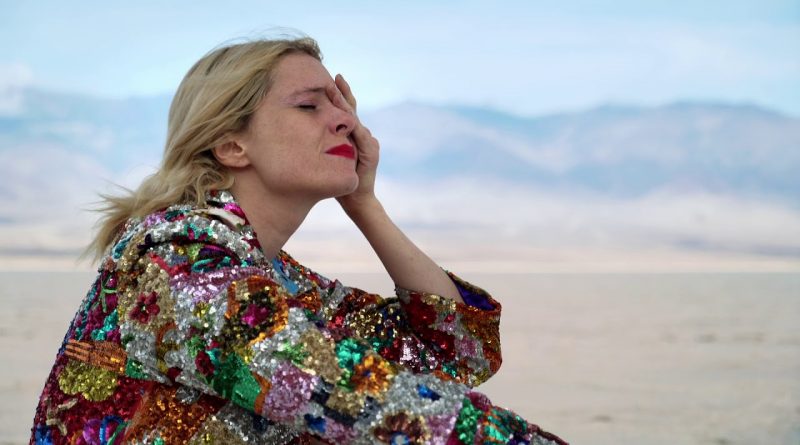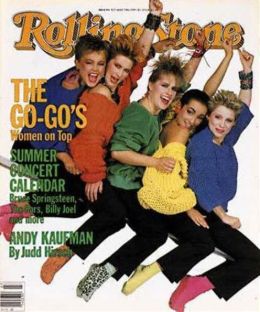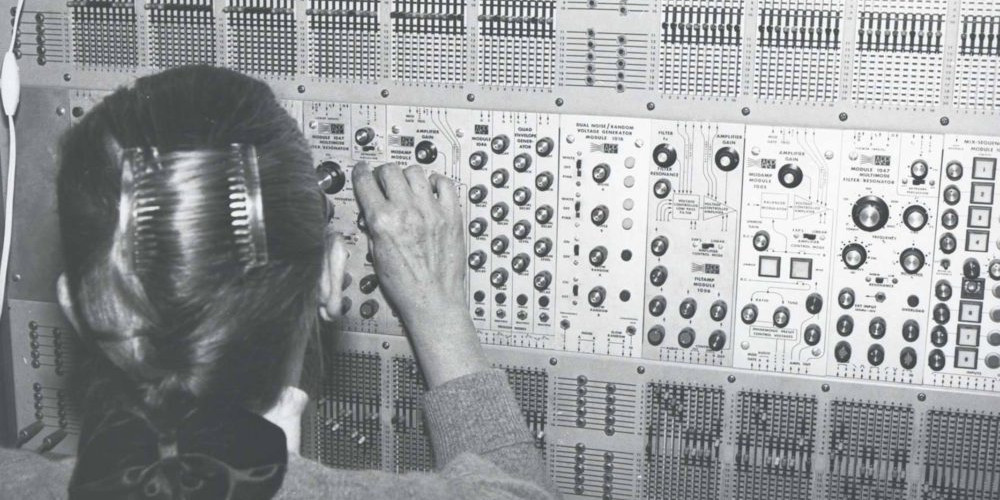By Glenn Dunks
At least once a year, we do a round-up of some of the music documentaries that are making the rounds. This year there is a particular focus on women in music with a range of titles covering pop (Kate Nash: Underestimate the Girl), punk and new wave (The Go-Go’s), rock (Suzy Q) and whatever it is that sits in between all of them (Sisters with Transistors)—and they of course sit alongside names like Dolly Parton, Tammy Wynette and Loretta Lynn in Ken Burns' Country Music, which we looked at recently.
I have actually already written about Liam Firmager and Tait Brady’s Aussie-made Suzi Q upon its local Australian release last year. I was impressed by its high energy retelling of the career of the “Devil Gate Drive” and "Can the Can" singer and guitarist Suzi Quatro. A rollicking is simply structured documentary that is appropriate daggy for the musician at its centre. You can read my full review at ScreenHub so let’s move on to the rest, which make for an entertaining dive through diverse musical stories.

To be perfectly honest, I wasn’t even sure if I was going to watch Amy Goldstein’s Kate Nash: Underestimate the Girl. Her music had not exactly permeated my musical bubble in the mid 2000s despite my affection for similar artists like Lily Allen, Katy B, Imogen Heap and Regina Spektor. And whether I figured she had just carried on recording or vanished into the musical ether like many slightly alt-leaning pop figures, I guess I hadn’t had any real reason to think of her a decade after her song "Foundations” popped up on the charts.
But that forms at least part of the reason of Goldstein’s film is so interesting. Nash’s career has a particularly modern arc from being discovered on MySpace to selling millions and winning awards to now using KickStarter to allow dedicated fans to help fund her records independently. The documentary charts a couple of years in her world as she navigates the evolving music industry and the many misfortunes that befell her career—from the loss of her recording contract to the very literal loss of her money by her manager, which unfolds as the film was being produced. Despite her age, Nash epitomises a lot of what is happening in the industry right now as she battles with issues of authenticity and the realities of business in a world where she is still perceived as the artist she was 12 years ago and where it's difficult to relaunch. "Kate Nash has committed career suicide – and it sounds amazing" said NME once famously said as respectable music people doubted her sincerity as anything but a bubbly pop singer. Legitimacy continues to come hard as she attempts to reboot her career in several different ways, including selling comic products in live-streams (cringe!) and starring in the Netflix series GLOW (Nash is a two-time SAG nominee!).

I was charmed by her perseverance and her righteous anger at not wanting “to keep battling these wankers all the time”. A very modern glimpse into what it takes to be a musician, an artist and a performer that thankfully strips away much of the unnecessary frou frou that usually comes along with these early career dives.
I saw the other two films, Alison Ellwood’s The Go-Go’s and Lisa Rovner’s Sisters with Transistors, as a part of Sheffield Doc/Fest. I watched them side-by-side on a Friday night of COVID lockdown with pizza and beer and I felt richer for it. Both much more traditional in their structure but each rich with history and empowered along by the sheer force of will by their subjects as they sought to change the music industry (and succeeded) and attitudes around women in music genres wherein they were typically the minority.
 Ellwood’s The Go-Go’s is the sort of film that you really have to wonder how it took so damn long for somebody to think of doing (of course, we all know how long it takes them to make movies). “The greatest girl group of all time” may be a bit of a stretch (even in 1981, Dan Ackroyd), but the impact of Jane, Belinda, Charlotte, Gina and Kathy is undeniably huge and the film is at its best when its treating them and their success with the sort of reverence that is all too ignored in other rock and punk documentaries (they began as an L.A. punk outfit, and only really with improving as musicians and vocalists did they become the more shimmering new wave-rock of “Our Lips Are Sealed” and “We Got the Beat”).
Ellwood’s The Go-Go’s is the sort of film that you really have to wonder how it took so damn long for somebody to think of doing (of course, we all know how long it takes them to make movies). “The greatest girl group of all time” may be a bit of a stretch (even in 1981, Dan Ackroyd), but the impact of Jane, Belinda, Charlotte, Gina and Kathy is undeniably huge and the film is at its best when its treating them and their success with the sort of reverence that is all too ignored in other rock and punk documentaries (they began as an L.A. punk outfit, and only really with improving as musicians and vocalists did they become the more shimmering new wave-rock of “Our Lips Are Sealed” and “We Got the Beat”).
It’s impossible to make a film like this a success without participation from those involved. There’s so many still photographs of rock stars in sweaters and hats (albeit, wonderful photographs), you know? And so alongside copious archival footage, the extensive involvement of all the band’s eventual members as well as key background figures allows for a deeper dive into what exactly went right and then wrong and then (if you’ve been paying attention) right again in the life of The Go-Go’s. This isn’t an adventurous film in regards to style, but if you crank the volume (like I am right now, typing this as a listen to Beauty and the Beat on vinyl) it will be hard to care. It's a shame this will never be experienced on a big screen.
Sharing stretches of similar time periods is Rovner’s Sisters with Transistors about the history of women in electronic music. While it touches on female composers more broadly, limiting to this particular realm highlights how instrumental they have been to the sounds that are today just a part of the fabric of music. Names like Wendy Carlos (Switched on Bach, Tron and The Shining) and Suzanne Ciani (the subject of A Life in Waves) are probably a bit better known, but Lithuanian theremin pioneer Clara Rockmore and the likes of Daphne Oram, Bebe Barron, Pauline Oliveros, Delia Derbyshire, Eliane Radigue and Laurie Spiegel will probably be less familiar (until you see and hear what they did). The film is smart to weave their personal stories at least a little bit through the broader narrative of women’s contributions to synthesized music.

Narration by Laurie Anderson adds just that extra dash, her tones sounding as if they float on their own wave. But, somewhat inevitably, unlike The Go-Go’s, the full scope of the Sisters’ subject is too much to encapsulate in a single film. What they do share, of course, is that very rebellious spirit embodied by this line by Doctor Who theme performer Delia Derbyshire: “I did all sorts of things that I was told I couldn’t do.” It’s something of a wonder to behold and to finally see their stories brought to the screen.
Release: Kate Nash: Underestimate the Girl is on BBC iPlayer and recently finished up a run at Alamo Drafthouse with a VOD release hopefully in the future. The Go-Go’s screens on Showtime July 31st as well as at Melbourne International Film Festival’s virtual 68½ festival. Sisters with Transistors will no doubt be making the virtual rounds, with updates available through their website. Suzi Q is available to stream on Amazon, iTunes and more.